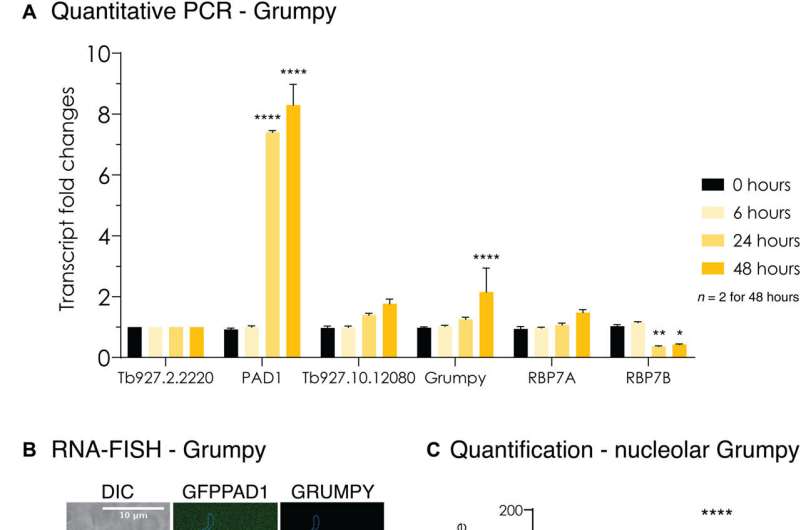June 17, 2022 report
Researchers find gene that prompts the African sleeping sickness parasite to convert to its dormant phase

A team of researchers from Portugal, Israel, Poland and Spain has found the gene that prompts the parasite Trypanosoma brucei to change from its normal long, slender shape to one that is short and stumpy. In their paper published in the journal Science Advances, the group describes how they found the gene and their hope that doing so will lead to a cure for African sleeping sickness.
African sleeping sickness is caused by Trypanosoma brucei transmitted by tsetse fly bites. People afflicted initially show no symptoms, giving the parasite time to multiply. Eventually, it makes its way to the brain, leading to personality and behavioral changes and sleep disorders. If left untreated, it is fatal. Prior research has shown that once the parasite reaches a certain saturation point in the body, individual kinetoplastids begin to change shape from a long, slender appearance to a shorter and stumpier form. Researchers have been studying the transformation in hopes of determining a way to get the parasite to transform earlier, because in its stumpy form, it cannot reproduce. In this new effort, the researchers found the gene responsible for initiating the shift.
The researchers found the gene by taking a closer look at so-called junk DNA—parts of the genome labeled as non-coding, and thus not likely to be of use to researchers. They analyzed the RNA produced via instructions from the genome at such sites and found 1,428 possibilities, which they narrowed to 399. They were then able to find one they called "grumpy" by studying nearby genes that were already known to play a role in the process of transformation. They confirmed their find by artificially increasing the same type of RNA in a parasite sample in mice and found that it induced the change to the stumpy form.
The findings are still preliminary—next, the researchers plan to determine whether upping the RNA samples in humans works equally well. They are also looking at developing tests to diagnose infections earlier, before brain damage occurs.
More information: Fabien Guegan et al, A long noncoding RNA promotes parasite differentiation in African trypanosomes, Science Advances (2022). DOI: 10.1126/sciadv.abn2706
Journal information: Science Advances
© 2022 Science X Network

















